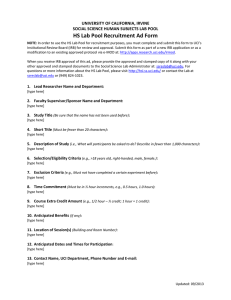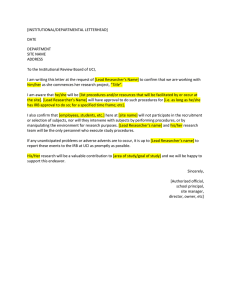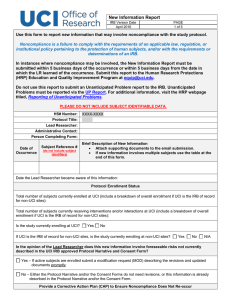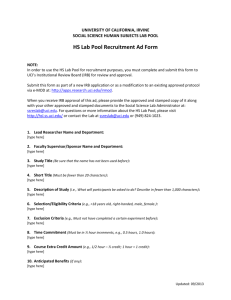UCI ADMINISTRATIVE POLICIES & PROCEDURES RESEARCH AND SPONSORED ACTIVITIES
advertisement
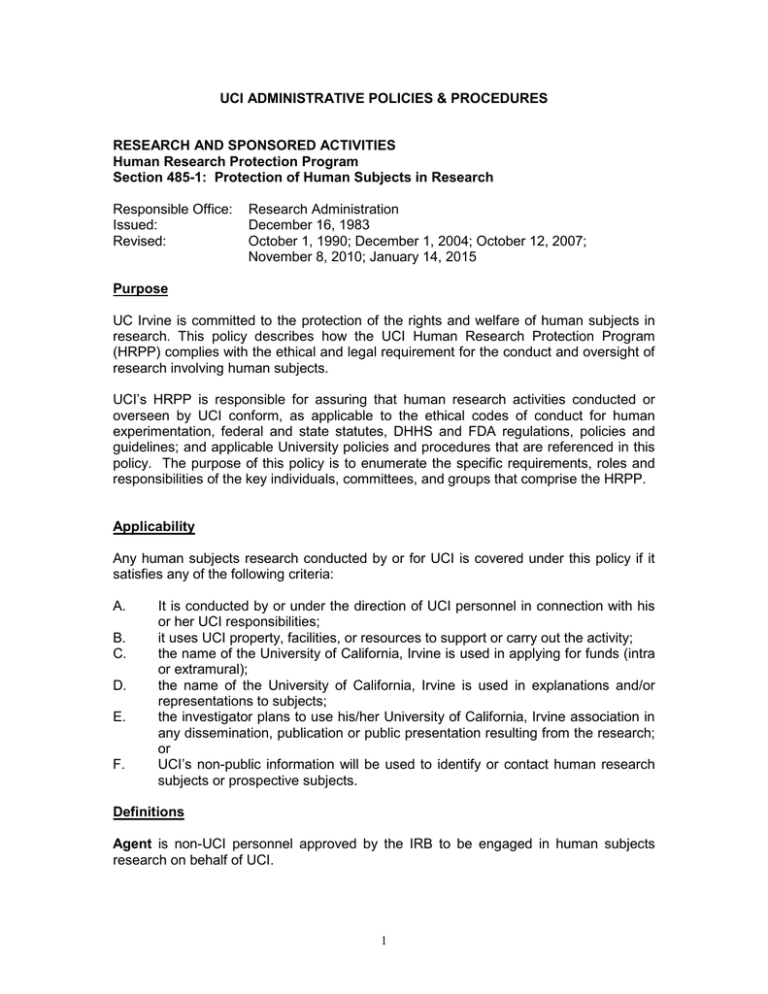
UCI ADMINISTRATIVE POLICIES & PROCEDURES RESEARCH AND SPONSORED ACTIVITIES Human Research Protection Program Section 485-1: Protection of Human Subjects in Research Responsible Office: Issued: Revised: Research Administration December 16, 1983 October 1, 1990; December 1, 2004; October 12, 2007; November 8, 2010; January 14, 2015 Purpose UC Irvine is committed to the protection of the rights and welfare of human subjects in research. This policy describes how the UCI Human Research Protection Program (HRPP) complies with the ethical and legal requirement for the conduct and oversight of research involving human subjects. UCI’s HRPP is responsible for assuring that human research activities conducted or overseen by UCI conform, as applicable to the ethical codes of conduct for human experimentation, federal and state statutes, DHHS and FDA regulations, policies and guidelines; and applicable University policies and procedures that are referenced in this policy. The purpose of this policy is to enumerate the specific requirements, roles and responsibilities of the key individuals, committees, and groups that comprise the HRPP. Applicability Any human subjects research conducted by or for UCI is covered under this policy if it satisfies any of the following criteria: A. B. C. D. E. F. It is conducted by or under the direction of UCI personnel in connection with his or her UCI responsibilities; it uses UCI property, facilities, or resources to support or carry out the activity; the name of the University of California, Irvine is used in applying for funds (intra or extramural); the name of the University of California, Irvine is used in explanations and/or representations to subjects; the investigator plans to use his/her University of California, Irvine association in any dissemination, publication or public presentation resulting from the research; or UCI’s non-public information will be used to identify or contact human research subjects or prospective subjects. Definitions Agent is non-UCI personnel approved by the IRB to be engaged in human subjects research on behalf of UCI. 1 Clinical Investigation means any experiment that involves a test article on one or more human subjects and that meets any of the following: (1) meets the requirements for prior submission to the FDA under section 505(i) of the Federal Food, Drug, and Cosmetic Act meaning any use of a drug other than the use of an approved drug during the course of medical care; (2) meets the requirements for prior submission to the FDA under section 520(g) of the Federal Food, Drug, and Cosmetic Act meaning any activity that evaluates the safety or effectiveness of a device; or (3) any activity where the results of which are intended to be submitted later to, or held for inspection by, the FDA as part of an application for a research or marketing permit. Engaged in research is when UCI employees or agents are: (1) intervening or interacting with human subjects; (2) accessing identifiable private information about human subjects; or (3) obtaining the informed consent of human subjects for the research. UCI follows OHRP “Guidance on Engagement of Institutions in Human Subjects Research” when applying this definition. Human Subject as defined by DHHS is (1) a living individual about whom an investigator conducting research obtains [e.g. reviews, analyzes, or records] (a) data through intervention or interaction with the individual; or (b) identifiable private information; or as defined by FDA (2) an individual who is or becomes a subject in research, either as a recipient of the test article or as a control. A subject may be either a healthy human or a patient. A human subject includes an individual on whose specimen an investigational device is used. Human Subjects Research is any research or clinical investigation that involves human subjects. Interaction includes communication or interpersonal contact between investigator and subject. Intervention includes both physical procedures by which data are gathered (e.g., venipuncture) and manipulations of the subject or the subject’s environment that are performed for research purposes. Identifiable Information means information that is individually identifiable (i.e., the identity of the subject is or may readily be ascertained by the investigator or associated with the information). IRB means an Institutional Review Board established in accord with DHHS and FDA regulations. IRB Approval/Registration means the determination of the IRB that the human subjects research has been reviewed and may be conducted by or for UCI within the constraints set forth by the IRB and by other institutional and Federal requirements. FDA means the DHHS Food and Drug Administration. The FDA oversees the safety of foods, drugs, devices, biologics and cosmetics for human use, and enforces DHHS regulations (21 CFR Parts 50 and 56) for the protection of human subjects and the general standards for the composition operation, and responsibility of an Institutional Review Board (IRB) that reviews clinical investigations. 2 Lead Researcher means the person with primary responsibility for meeting all ethical, scientific, and regulatory requirements for the conduct of human subjects research, whether or not acting as the Principal Investigator for the award that funds the study. Legally Authorized Representative means a person authorized either by California statute or by court appointment to make legal decisions on behalf of another person. In human subjects research, an individual or judicial or other body authorized under applicable law to consent on behalf of a prospective subject to the subject's participation in the procedure(s) involved in the research. Offsite means occurring outside of UCI owned, operated, or leased facilities (including international sites). For purposes of research oversight, private facilities located on UCI land are considered offsite locations. OHRP means the DHHS Office for Human Research Protections. The OHRP implements a program of compliance oversight for DHHS regulations (45 CFR Part 46, Subparts A-D) for the protection of human subjects. Private Information includes information about behavior that occurs in a context in which an individual can reasonably expect that no observation or recording is taking place, and information which has been provided for specific purposes by an individual and which the individual can reasonably expect will not be made public (e.g., a medical record). Research is any systematic investigation, including research development, testing and evaluation, designed to develop or contribute to generalizable knowledge. State Death Data Records are state of California issued death certificates and indices containing personal identifying information. The state of California requires IRB review of studies using state issued death records. Test Article means any drug (including a biological product for human use), medical device for human use, human food additive, color additive, electronic product, or any other article subject to regulation under the Federal Food, Drug, and Cosmetic Act. UCI Facilities are facilities owned, operated, or leased by UCI including UCI campus, UCIMC, and any space rented to the University. UCI Personnel are UCI students, staff, and faculty (including part-time, emeritus, and volunteer faculty), or any other agents of UCI. UCI Resources are funds, facilities, employee time, equipment, supplies, services, and non-public information. University Duties are responsibilities assigned by the University or tasks performed to meet expectations of one's employment, affiliation, appointment, or academic program. Policy Statement In order to demonstrate appropriate oversight of human research activities and to comply with federal and state statutes, DHHS and FDA regulations, policies and 3 guidelines; and applicable University policies and procedures, no human subjects research or use of state death data records, as defined in this policy, shall be initiated by or for UCI prior to obtaining UCI IRB review and approval or registration. The UCI IRBs have the authority to review and approve, require modifications of (to secure approval), or disapprove all human subjects research activities that are covered by this policy, or are performed at or in collaboration with offsite locations. All other applicable regulatory committee approvals (e.g., Conflict of Interest Oversight Committee, Human Stem Cell Research Oversight Committee, Institutional Biosafety Committee), University approvals, and completion and/or receipt of all other necessary documentation (e.g., evidence of IRB approval or permission letters from collaborating locations) are required prior to the initiation of any human research activity. No other UCI officials may approve human subjects research that has not been approved by the UCI IRB. Studies funded by outside entities, such as drug or device companies, require an agreement between the University and the company. If UCI will receive compensation for conducting or directing a research activity, a contract must be established through UCI Office of Research Administration, Sponsored Projects. When contracts or other agreements are required, the language is to be developed and negotiated by Sponsored Projects staff to document UCI’s responsibilities for the conduct of the specific project. Authority and Responsibility Vice Chancellor for Research Responsibilities The Vice Chancellor for Research (VCR) or designee, serving as the designated Institutional Official (IO), has responsibility for the UCI Human Research Protection Program. The VCR has the responsibility to: A. Assures compliance with applicable federal statutes and regulations, policies and guidelines, and applicable University policies and procedures concerning human research activities, as delegated by the UCI Chancellor. B. Support, facilitate, and promote the ethical codes of conduct for research involving human subjects by demonstrating institutional commitment to uphold the standards set forth in the federal statues and regulations, policies and guidelines, and applicable University policies and procedures concerning Human Research. C. Allocate resources to the Human Research Protection to ensure that the Human Research Protection Program has sufficient resources, including IRBs appropriate for the volume and types of Human Research to be reviewed, so that reviews are accomplished in a thorough and timely manner. D. Establish campus policy for the Human Research Protection Program to increase the likelihood that Human Research will be conducted in accordance with applicable federal statutes and regulations, policies and guidelines, and applicable University policies and procedures concerning human research activities, as delegated by the UCI Chancellor. E. Ensure that the research review process is independent and free of coercion or undue influence, and ensure that officials of the organization cannot approve research that has not been approved by an IRB designated by the organization. F. Appoint and remove IRB members and IRB chairs. 4 G. H. I. J. K. Evaluate the performance of the chairs and vice chairs. Review and sign federal assurances and addenda. Determine what IRBs the organization will rely upon. Approve and rescind IRB authorization agreements. Place limitations or conditions on an investigator’s or research staff’s privilege to conduct Human Research. L. Suspend or terminate IRB approval of research. M. Disapprove research approved by the IRB. N. Report to OHRP and FDA any unanticipated problems involving risks to subjects or others, any serious or continuing noncompliance with federal regulations, IRB requirements or determinations, and any suspension or termination of IRB approval of federally supported human research projects and FDA-regulated clinical research studies. IRB Committee Responsibilities The IRB Committees have the responsibility to: A. Follow written policies and procedures for conducting initial and continuing review of research, and determining which projects require review more often than annually and which projects need verification from sources other than the investigators that no material changes have occurred since the previous IRB review. B. Report their findings and actions to the investigator and institution (e.g., department chair, dean, IO) as applicable. C. Ensure prompt reporting of proposed changes in a research activity, and ensure that such changes in approved research are not initiated without IRB review and approval, except when necessary to eliminate apparent immediate hazards to subjects. D. Report to the IO any unanticipated problems involving risks to subjects or others, or any serious or continuing noncompliance with federal regulations, IRB requirements or determinations, and any suspension or termination of IRB approval. E. Review research at convened meetings with a majority of IRB members present, except when an exempt or expedited review procedure is used. F. Assure that risks to subjects are minimized, risks to subjects are reasonable in relation to anticipated benefits, and selection of subjects is equitable. G. Ensure that informed consent is sought from each prospective subject or the subject's legally authorized representative and informed consent is appropriately documented. H. Assure that adequate provisions for monitoring data collection are in place to ensure the safety of subjects and, when appropriate, adequate provisions are in place to protect the privacy of subjects and to maintain the confidentiality of data. I. Ensure additional safeguards are in place to protect the rights and welfare of subjects likely to be vulnerable to coercion or undue influence. J. Assure human research activities that involve uses and disclosures of protected (personal) health information are reviewed in accord with UC privacy standards. IRB Committee Chair Responsibilities IRB Committee Chairs have the responsibility to: A. Ensure that the IRBs perform their functions as outlined in this policy and federal regulations for the protection of human subjects. B. Act as liaisons with the IO on behalf of the IRBs. 5 C. D. E. Halt any human research activity if the safety or welfare of a subject appears to be at risk, or if the work performed on a project is not in accordance with the approved protocol. Address in a timely fashion, any serious or repeated problems, concerns, complaints or allegations regarding the rights and welfare of human subjects. Report any subject safety or welfare issues and/or possible non-compliance to the IRBs. Human Research Protections Unit Responsibilities The Human Research Protections unit in the Office of Research serves as the office of record for the UCI Human Research Protection Program. The HRP unit has the responsibility to: A. Support and coordinate all of the activities by serving as the liaison between the IRBs and the UCI research community. B. Facilitate the protocol review process. C. Conduct administrative pre-reviews of IRB submissions and communicate to investigators in writing to resolve issues prior to IRB review. D. Communicate to investigators in writing, on the behalf of the IRBs, all committee decisions and actions. E. Provide training, education, and consultation services on regulatory requirements and institutional policies and procedures. F. Inform the IO of any study-related issues that are likely to present risks or other concerns for the institution. G. Communicate with other UCI administrative units and regulatory committees, as appropriate. H. Conduct administrative audits (reviews) of alleged occurrences of regulatory noncompliance in collaboration with the IRBs in accordance with campus policy. I. Assists the IRBs in the conduct of regulatory committee reviews in accordance with campus policy. J. Reports to the IO on behalf of the IRB, any unanticipated problems involving risks to subjects or others, or any serious or continuing noncompliance with federal regulations, IRB requirements or determinations, and any suspension or termination of IRB approval. Lead Researcher Responsibilities The Lead Researcher (LR) is responsible for the performance of human subjects research, the protection of the rights and welfare of the human subjects, and strict adherence by all co-investigators and research personnel to all IRB requirements, federal regulations, state statutes and institutional policies for human subjects research. The LR has the responsibility to: A. Ensure that all co-researchers and personnel engaged in human subjects research have been educated about human subject protection requirements and have read and understand the approved protocol and all procedures to be performed. B. Submit for IRB approval or registration prior to the commencement of any human research activity and initiates human research activities only after written IRB approval is provided. C. Recognize that IRB approval, in and of itself, does not necessarily constitute permission for implementation of human research projects. Accordingly, the project should not begin until all required approvals have been obtained. 6 D. E. F. G. H. I. J. K. L. M. Assure that the legally effective informed consent of all human subjects or their legally authorized representatives (unless waived) is obtained. Ensure that no changes to the approved protocol or consent form are made without first having submitted those changes for review and approval by the UCI IRB, unless the changes are necessary to eliminate an apparent immediate hazard to subjects. Assure any unanticipated problems involving risk to subjects or others are reported per UCI IRB policy. Respond appropriately to participants’ complaints or requests for information about the study; and reports to the IRB through the unanticipated problems reporting process any participant complaints that cannot be resolved by the study team. Provide the IRB with any information requested relative to the protection of human subjects. Comply with an IRB decision to suspend or withdraw its approval of a human research activity. Assure the appropriate administration and control of investigational test articles. Obtain continuing approval prior to the expiration date of the study and recognizes human research activities must cease until current IRB approval is obtained. File a final closing report with the IRB at the conclusion of the study. Maintain and make available for inspection by the IRB, authorized University officials, and federal agency inspectors, all IRB protocol and study records in accordance with federal regulations. Legal Counsel Legal Counsel has the responsibility to: A. Provide advice upon request to the IO, the IRB, the Director and other individuals involved with the Human Research Protection Program. B. Resolve conflicts among applicable laws. Deans, Directors, Department Chairs, Division Chiefs, Section Heads have the responsibility to: A. Promote the ethical codes of conduct for research involving human subjects in their department or school, by demonstrating institutional commitment to uphold the standards set forth in the federal statues and regulations, policies and guidelines, and applicable University policies and procedures concerning Human Research. B. Supervise the conduct of Human Research by investigators in their department or school, including the scientific and financial management of sponsored projects. C. Forward complaints and allegations regarding the Human Research Protection Program to the Organizational Official. D. Ensure that each Human Research study conducted in their department or school has adequate resources Deans, Directors, and Chairs have the responsibility to report any failure of a faculty or staff member to carry out their human research responsibilities and recommend appropriate disciplinary action. 7 Deans and Chairs have the responsibility to recommend and encourage faculty members from the department, unit, school, or college to serve on the IRB. Requirements: Ethical A. The National Commission for the of Human Subjects in Behavioral and Biomedical Research report titled “Ethical Principles and Guidelines for the Protection of Human Subjects of Research” aka “The Belmont Report.” The Belmont Principles (Respect for Persons, Beneficence and Justice) apply to all UCI human subject activities. B. Declaration of Helsinki, last amended October 2008, is a statement of ethical principles for medical research involving human subjects, including research on identifiable human material and data. The statement is useful in helping to guide IRB deliberations and decision making responsibilities. C. Nuremberg Code, an outcome of Nuremberg Military Tribunals: U.S. v. Karl Branch constituted the first international ethical guidelines on human research. The standards prescribed by the Code are useful in helping to guide IRB deliberations and decision making responsibilities. Federal Regulations D. Department of Health and Human Services (DHHS) Regulations, Policy for the Protection of Human Research Subjects, 45 CFR Part 46, Subparts A-D, published January 26, 1981 (Federal Register, Vol. 46, No. 16), effective July 27, 1981 in accordance with Public Law 93-348 and all subsequent amendments thereto. E. DHHS, Food and Drug Administration, 21 CFR Part 50 Human Subjects Protections and 21 CFR Part 56 Institutional Review Boards, published January 27, 1981 (Federal Register, Vol. 46, No. 17), effective July 27, 1981, and all subsequent amendments thereto. F. DHHS, Food and Drug Administration,regulations regarding the Protection of Human Subjects 21 CFR 312 Investigational New Drug Application and 21 CFR 812 Investigational Device Exemptions G. Other DHHS department or agency regulations relevant to the Protection of Human Subjects: I. Department of Justice (DOJ) - 28 CFR §22 II. Department of Defense (DOD) - DOD Directive 3216.02, which includes the requirement to apply 45 CFR §46 Subparts B, C, and D III. Department of the Navy (DON) - SECNAVINST 39000.39D IV. Department of Education (ED) - 34 CFR §97 Subpart D (equivalent to 45 CFR §46 Subpart D), 34 CFR §98.3, 34 CFR §98.4, 34 CFR §356.3, and 34 CFR §99 V. Department of Energy (DOE) - DOE O 443.1A VI. Environmental Protection Agency (EPA) 40 CFR §26 which includes the requirement to apply 45 CFR §46 Subparts B and D. 8 H. California Health and Safety Code, Sections 24170-24197.5, and other applicable state laws pertaining to the protection of human subjects in research. I. University of California Policy on the Protection of Human Subjects in Research, issued September 2, 1981, and all subsequent amendments thereto, including the January 19, 1979, University Policy for Medical Treatment of Human Subjects for Injuries Resulting from Participation in Research. J. UC Systemwide Standards and Implementation Policies for the Health Insurance Portability and Accountability Act Privacy Rule, Standard Nine: Uses and Disclosures for Research, issued April 2003. K. UCI Federalwide Assurance of Compliance (FWA#00004071) with the DHHS Office of Human Research Protections. L. UCI Delegation of Authority, IDA130 – Human and Animal Subjects Protection, issued July 21, 1995; UCI Delegation of Authority, IDA399 – Human and Animal Subjects Protection, issued April 6, 2005. M. UCI Research Policy: Offsite Research Activities, issued May 19, 2003. N. UCI Research Policies: Responsibilities for Conduct and Administration of Research, issued January 31, 1998, amended December 1, 2004; May 23, 2005. O. Policies and procedures that are applied to Human Subjects Research conducted domestically are applied to Human Subjects Research conducted in other countries. Human Research Protections Policies and Procedures Policies and procedures for the Human Research Protection Program along with practical guidance are available on the HRP web site @ http://www.research.uci.edu/compliance/human-research-protections/index.html 9
